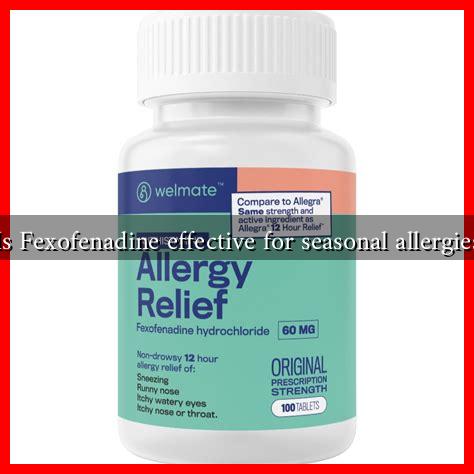-
Table of Contents
Is Fexofenadine Effective for Seasonal Allergies?
Seasonal allergies, often referred to as hay fever or allergic rhinitis, affect millions of people worldwide. Symptoms can range from sneezing and nasal congestion to itchy eyes and fatigue. With various treatment options available, one medication that has gained popularity is fexofenadine. This article explores the effectiveness of fexofenadine for seasonal allergies, backed by research and expert opinions.
Understanding Fexofenadine
Fexofenadine is a second-generation antihistamine commonly used to relieve allergy symptoms. Unlike first-generation antihistamines, such as diphenhydramine, fexofenadine is less likely to cause drowsiness, making it a preferred choice for many individuals. It works by blocking the action of histamine, a substance in the body that causes allergic symptoms.
How Fexofenadine Works
When allergens such as pollen enter the body, the immune system responds by releasing histamines. These histamines bind to receptors in the body, leading to symptoms like itching, sneezing, and runny nose. Fexofenadine inhibits this process by:
- Blocking H1 receptors, preventing histamine from exerting its effects.
- Reducing the overall allergic response, leading to symptom relief.
- Providing longer-lasting effects compared to some other antihistamines.
Clinical Evidence Supporting Fexofenadine
Numerous studies have evaluated the effectiveness of fexofenadine in treating seasonal allergies. A notable study published in the Journal of Allergy and Clinical Immunology found that fexofenadine significantly reduced symptoms of allergic rhinitis compared to a placebo. Participants reported improvements in:
- Nasal congestion
- Runny nose
- Itchy and watery eyes
Another study highlighted that fexofenadine provided relief for up to 24 hours, allowing individuals to manage their symptoms effectively throughout the day. This long duration of action is particularly beneficial for those who experience severe symptoms during peak pollen seasons.
Comparative Effectiveness
When compared to other antihistamines, fexofenadine holds its ground well. A meta-analysis published in the British Journal of Clinical Pharmacology indicated that fexofenadine was as effective as other second-generation antihistamines like loratadine and cetirizine, with a similar safety profile. However, fexofenadine was noted for having a lower incidence of sedation, making it a more suitable option for individuals who need to remain alert.
Potential Side Effects
While fexofenadine is generally well-tolerated, some individuals may experience side effects, including:
- Headache
- Dizziness
- Nausea
It is essential for users to consult with healthcare professionals before starting any new medication, especially if they have pre-existing health conditions or are taking other medications.
Conclusion
Fexofenadine has proven to be an effective treatment for seasonal allergies, providing significant relief from symptoms with minimal sedation. Its long-lasting effects and favorable safety profile make it a popular choice among both patients and healthcare providers. As with any medication, individual responses may vary, and it is crucial to consult with a healthcare professional to determine the best treatment plan for managing seasonal allergies.
In summary, fexofenadine stands out as a reliable option for those suffering from seasonal allergies, allowing them to enjoy their daily activities without the burden of allergy symptoms. With ongoing research and advancements in allergy treatments, individuals can look forward to more effective solutions in the future.




